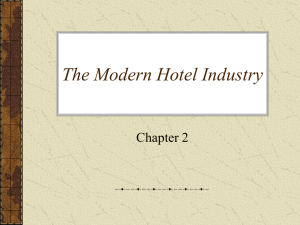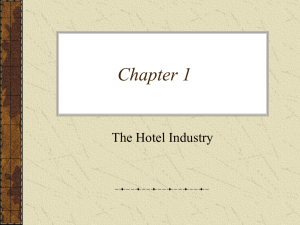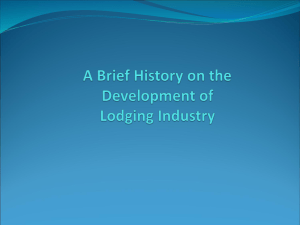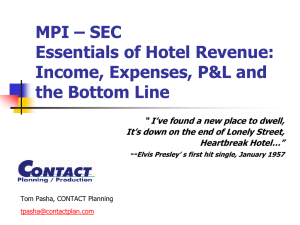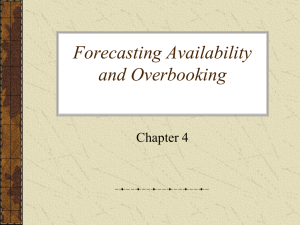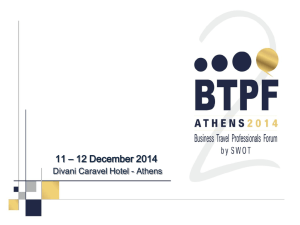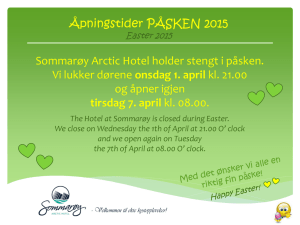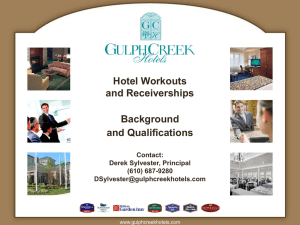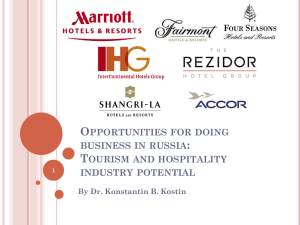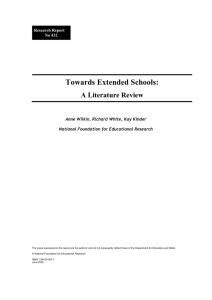ch. 10 The World of Lodging
advertisement
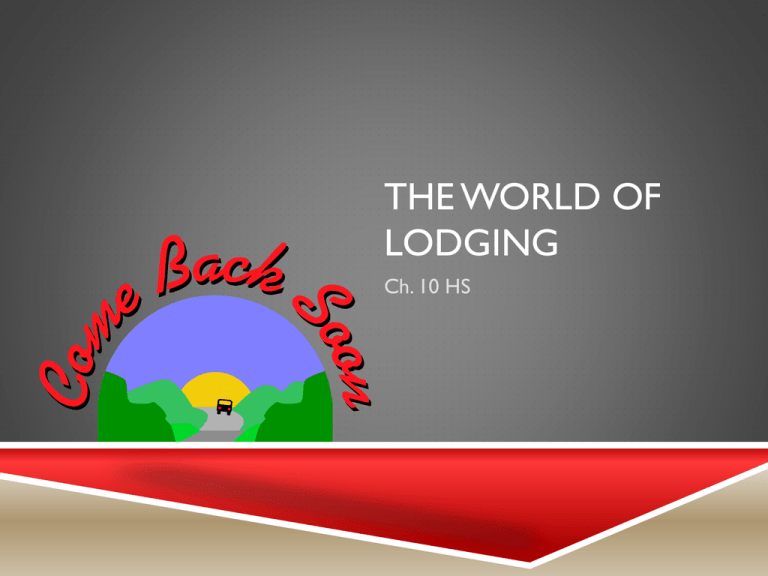
THE WORLD OF LODGING Ch. 10 HS Section 1 TYPES OF LODGING BUSINESSES FULL-SERVICE HOTEL Is large and provides any services Distinguishing features are its architecture and level of service Usually two or more stories high Concierge – is a hotel staff member who helps guests make arrangements, and advises guests on what to do and see in the area of the hotel Five sub-categories of full-service hotels: Convention, luxury, resort, extended-stay and condominium FIVE SUB-CATEGORIES OF FULL-SERVICE HOTELS Convention Hotel – designed to provide for the special needs of conventions and trade shows Convention – large meeting, usually sponsored by a group of its members Trade show – an exhibit during which people who have goods and services to sell show their goods and services Exhibit Hall – the space where a trade show is held Convention Center – a large building designed specifically to hold large meetings, conventions, and trade shows Luxury Hotel – provides the highest level of amenities, service, room furnishings, public spaces, and technology Resort Hotel – caters to the vacationer or leisure traveler Resort – a place that provides entertainment, recreation, and relaxation for vacationers FIVE SUB-CATEGORIES OF FULL-SERVICE HOTELS Extended-Stay Hotels – for people who need lodging for five or more days Three types: Extended-stay All-suite Residential Suite – a hotel accommodation that consists of more than one room Usually two hotel rooms joined together Sometimes includes kitchen facilities Condominium Hotels – are multiple room apartments with kitchens Time-share Ownership – owner owns the rights to use the unite for a specific time of the year LIMITED SERVICE PROPERTIES Limited-Service Property – smaller, provides fewer services, and is less expensive than a full-service hotel Motels – first-limited service hotels Is one or two stories high, with no interior corridors and no elevators Continental Breakfast – consists of breakfast foods that do not need to be cooked Inn – a smaller hotel, but larger than a motel Two categories – limited-service hotels and budget hotels Limited-Service Hotels – offer a medium level of service and a midrange price Typically three or four stories tall, has the word inn as part of its name, and offer more services than a motel but fewer than a hotel Do not have a restaurant or bellman services Budget Hotels – have the lowest rates and the least service Also called economy hotels, budget motels, or economy motels Goal – to focus on offering a comfortable, clean place to sleep at the lowest rate Microtel – offer rooms with 30% less space ad have built-in furniture SPECIALTY ACCOMMODATIONS Specialty Accommodations – includes a variety of accommodations that are not hotels, motels, or institutional housing Five categories of Specialty Accommodations Conference centers Lodges Bed-and-Breakfast operations Hotels Campgrounds FIVE CATEGORIES OF SPECIALTY ACCOMMODATIONS Conference Centers – a lodging facility where 60% or more of the total occupancy is generated by conferences Usually offer a complete package of sleeping rooms, meeting rooms, and meals Lodges – provide rooms and housekeeping for those guests who want to participate in a recreational activity Bed-and-Breakfast Operations – a private home offering one to five guest rooms Are for guests looking for personal service and charming locations Include a home-cooked breakfast and an opportunity to meet the host family and the other guests Large B&Bs are sometimes called Inns FIVE CATEGORIES OF SPECIALTY ACCOMMODATIONS Hostels – an inexpensive place to stay where sleeping rooms, bathrooms, and kitchen facilities are shared No linens, toilet articles or housekeeping services are provided Campgrounds – are places to pitch a tent or park an RV with limited bathroom facilities Can be basic, cold water and outhouse, or luxurious, hot showers and modern plumbing Located in natural areas where people go to hike and enjoy the scenery Institutional Housing – provided for people who live in institutions Include schools, universities, hospitals, prisons, and the military Dormitory – is a large sleeping room filled with bed for many guests Senior Housing – provides places to live for people over 55 More like a resort; can rent or buy in a complex Includes more standard facilities and conveniences Section 2 LOCATION FIVE MAIN LOCATIONS Center City Suburban Highway Airport Resort FIVE MAIN LOCATIONS Center City Downtown property Near large office buildings and retail stores Close to city’s entertainment services Suburban Full-service, Limited-service, and specialty accommodations can be found in the suburbs Highway Most accommodations along the high-ways are limited service hotels and budget hotels Airport Full-service, Limited-service, and specialty accommodations can be found in or near airports Resort Full-service, Limited-service, and specialty accommodations can be found in all resorts Locations are very popular places to visit Section 3 OWNERSHIP & LOCATION HOTEL CHAINS Chains – multiple-businesses that have the same brand name and the same ownership Main advantages are brand name and the ability to save money by purchasing supplies in large quanitites Develop customer loyalty through frequent guest programs HOTEL MANAGEMENT Hotel Management – the day-to-day running of a hotel Also called Hotel Operation Section 4 AFFILIATION, SIZE & PRICE, AND ROOM RATES AFFILIATION Referral System – a group of independent hotels that creates a central office for reservations and marketing Also knows as Affiliation Group or a Consortium SIZE & PRICE A small property has 1 to 50 rooms A midsize property has 51 to 200 rooms A large property has 201 or more rooms Three price categories: Premier Moderate Budget The categories indicate the level of service ROOM RATES Rack Rate – is the official rate for one night’s lodging property Room Rate – is the price actually charged for a guest for one night’s lodging Rates must be competitive with rates of similar hotels Offer special rates in specific situations and for specific types of guests Section 5 LODGING MARKET MARKET SEGMENTS Business – consists of people traveling for business Must have access to mailing services, copy machines, and fax machines Sleeping room must include desk and chair, phone at desk, and internet access Conventions and Meetings – consists of people traveling to a specific convention or meeting Can be for a business, or professional and social organizations Leisure – consists of people traveling on vacation or for personal reasons Budget – consists of people looking for the cheapest accommodations Long-Stay – consists of people who need accommodations for five or more days Special – includes groups who have made special arrangements with the lodging business for low rates Guest Mix – the percentage of each segment that is staying at a lodging property Section 6 FUNCTIONS IN LODGING FOODSERVICE AND CONCEPTS Meal Plan – a room rate that includes meals Four Types of Meals Plans: Full American – three meals Modified American – two meals Continental – continental breakfast European – no meals Lodging Concept – the whole idea of the lodging property or chain Includes the theme, target market, décor, ambiance, and level of service
